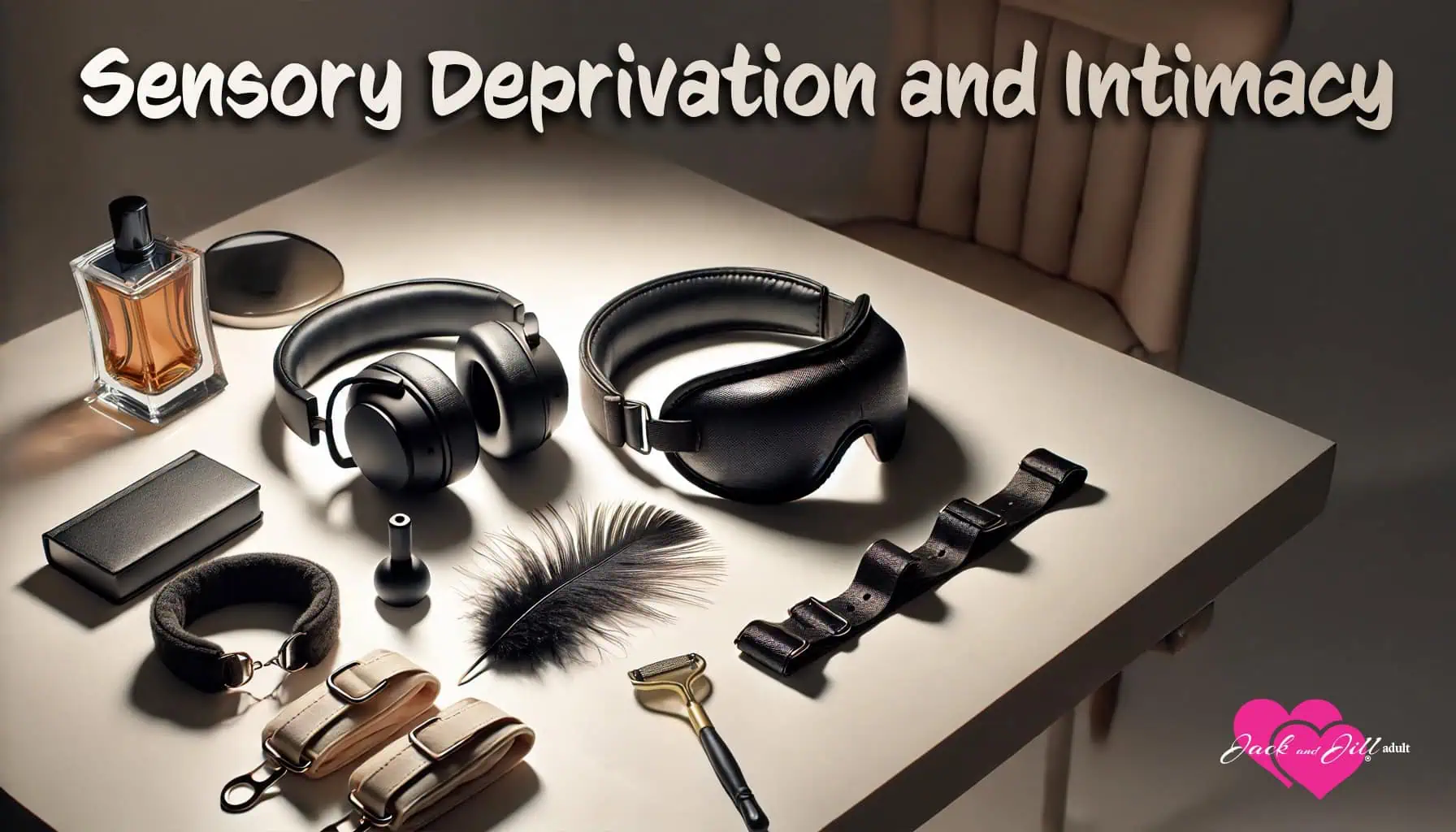
Sensory Deprivation and Intimacy
When we think of intimacy, most people imagine a whole sensory experience—seeing, hearing, touching, tasting, and smelling. However, what if Sensory Deprivation and Intimacy could deepen your emotional and physical connection with your partner by turning off one or more of these senses?
Sensory deprivation is a concept often used to heighten awareness of other sensations. Intimacy can create a profound, focused experience that fosters trust, vulnerability, and heightened pleasure. By intentionally removing stimuli, couples can connect on a deeper level, both physically and emotionally, cultivating a deep connection with their partner’s body that enhances their bond.
What Is Sensory Deprivation?

Scandal Corset Lace Hood – Black
Sensory deprivation involves deliberately blocking one or more senses to reduce external stimuli. For example, blindfolding can remove sight, and noise-canceling headphones can block sound. The idea is to heighten awareness of the other senses, sharpening sensitivity to touch, taste, and scent while cultivating a greater emotional connection as partners rely more on trust and anticipation. This heightened awareness can make the touch on a partner’s body more profound, enhancing mutual exploration and communication.
The brain reallocates its focus by turning off a sense, intensifying the remaining sensations, and creating an atmosphere of raw and powerful intimacy. Sensory deprivation can also influence autonomic responses, such as blood pressure, as the body adjusts to the altered sensory input.
Benefits of Sensory Deprivation
Sensory deprivation can have numerous benefits for individuals and couples, particularly in intimate relationships. By restricting one or more senses, individuals can heighten their awareness of their partner’s physical sensations. This can lead to a deeper connection and increased intimacy as individuals become more attuned to each other’s needs and desires.
Some of the benefits of sensory deprivation include:
Increased Intimacy and Connection
Focusing on fewer senses can help couples experience a deeper emotional and physical connection. This heightened focus allows partners to be more present and engaged with each other.
Heightened Awareness of Physical Sensations
With reduced sensory input, the body becomes more sensitive to touch and other physical sensations. This increased body awareness can make intimate moments more intense and pleasurable.
Reduced Performance Anxiety and Stress
Sensory deprivation can create a pressure-free environment, helping to alleviate performance anxiety and stress. Individuals can relax and enjoy the present moment without the distraction of external stimuli.
Improved Communication and Trust
Sensory deprivation requires clear communication and trust between partners. This practice can strengthen the emotional bond and enhance mutual understanding.
Increased Feelings of Pleasure and Enjoyment
Focusing on the remaining senses can help individuals experience heightened pleasure and enjoyment during intimate moments. The brain compensates for the lack of sensory input by intensifying the still available sensations.
Types of Sensory Deprivation
Individuals and couples can explore several types of sensory deprivation, each offering unique benefits and experiences.
Visual Deprivation

Ouch By Shots Eye Mask Glow In The Dark
Heightening the Sense of Touch Through Sensory Input
Removing sight, in particular, can amplify a partner’s sense of touch. When a partner is blindfolded, their body becomes more sensitive to every touch—whether it’s the soft brush of fingertips or a gentle kiss. The brain compensates for the lack of visual information by making the skin hyper-aware of even the slightest sensations.
This heightened awareness can make each touch feel more significant and intense, allowing couples to explore different types of contact, from feather-light caresses to firmer, more intentional pressure. Partners can indicate their preferences for more or less pressure, guiding each other non-verbally to achieve a pleasurable experience. Without the distraction of sight, couples may also become more experimental, trying new textures and sensations they might have previously overlooked.
Visual deprivation involves restricting or blocking one’s sense of sight, often through blindfolds or other visual barriers, which can heighten one’s awareness of one’s body and other senses, including touch, hearing, and smell.
Some benefits of visual deprivation include:
Increased Awareness of Physical Sensations:
Without visual distractions, the body becomes more attuned to touch and other physical sensations, enhancing body awareness.
Heightened Sense of Touch:
The absence of sight can make the skin more sensitive to tactile stimuli, making every touch feel more significant and intense.
Reduced Visual Distractions:
By removing visual input, individuals can focus more on their partner and the intimate connection, fostering a deeper emotional bond.
Auditory Deprivation

Sound and Silence in Sexual Connection
Another powerful form of sensory deprivation is the removal of sound. One partner is isolated from external noise by using noise-canceling headphones or earplugs, creating a cocoon of silence. This deprivation can amplify the sense of touch and create a more meditative, focused experience for the person wearing them.
This silence opens up new possibilities for creative communication for the partner who retains their sense of sound. Whispering, verbal teasing, or simply letting the sounds of breath and movement fill the room can evoke a new level of intensity. Meanwhile, the deprived partner may feel more attuned to their own body, becoming more aware of the rhythm of their breath, the pounding of their heartbeat, or the subtle movements of their partner. Additionally, auditory deprivation can heighten awareness of the partner’s body, fostering a deeper connection and understanding through mutual touch and interaction.
Some benefits of auditory deprivation include:
Increased Awareness of Physical Sensations:
When the sense of hearing is muted, individuals become more aware of their bodies and the physical sensations they experience.
Heightened Sense of Touch:
The absence of sound can make the skin more sensitive to touch, enhancing tactile sensitivity.
Reduced Auditory Distractions:
Eliminating external noise allows individuals to focus more on their partner and the intimate connection, creating a more immersive experience.
Tactile Deprivation

Sex & Mischief Sensory Fingertips Black
Tactile deprivation involves restricting or blocking one’s sense of touch, often through restraints or other tactile barriers. This can heighten one’s awareness of one’s body and their partner’s body, as well as one’s awareness of their other senses, including sight, hearing, and smell.
Some benefits of tactile deprivation include:
Increased Awareness of Physical Sensations:
Limiting touch can help individuals become more attuned to their other senses, enhancing overall body awareness.
Heightened Sense of Sight:
The absence of touch can make visual stimuli more pronounced, increasing visual sensitivity.
Reduced Tactile Distractions:
By restricting touch, individuals can focus more on their partner and the intimate connection, fostering a deeper emotional bond.
By exploring these different types of sensory deprivation, couples can discover new ways to enhance their intimate connection and deepen their emotional bond.
Experimenting with Scent and Taste

Kama Sutra Getaway Kit – Asst. Flavors
While sight and sound are the most commonly explored senses in sensory deprivation, couples can also experiment with scent and taste. A blindfolded partner may find that scents—such as perfume, essential oils, or even natural body smells—become more noticeable and impactful. Scent has a strong connection to memory and emotion, and by focusing on this sense, partners can create powerful, intimate moments tied to specific smells.
Taste, too, can take on new dimensions when other senses are muted. Feeding each other blindfolded or with ears covered, for example, can turn a simple act into a sensual experience, as the brain focuses on the flavors and textures of food or drink without the distraction of sight. You can search online to find more resources or events related to sensory deprivation.
The Role of Trust in Sensory Deprivation
At its core, sensory deprivation during intimate moments requires trust. When one partner is deprived of sight, sound, or other senses, they trust their partner to guide them safely through the experience. This trust can foster a deeper emotional connection as both partners are more attuned to each other’s boundaries, desires, and needs. Trust is essential for building a fulfilling, intimate relationship.
The person experiencing deprivation’s heightened vulnerability allows for more intimate and mindful interactions. Without the distraction of external stimuli, both partners are forced to communicate in new ways, relying on touch, breath, and subtle physical cues to maintain their connection.
Safety and Best Practices
Safety and best practices are paramount when exploring sensory deprivation and sensate focus exercises. These activities can significantly enhance emotional intimacy and physical connection but require careful planning and mutual understanding to ensure a positive experience.
Communication and Consent
Effective communication and consent are the cornerstones of successful sensory deprivation or sensate focus exercises. Before diving into these activities, have an open and honest conversation with your partner about your boundaries, desires, and expectations. Discuss what you are comfortable with and what you are not, and ensure both partners are on the same page.
Establishing a safe word or signal is crucial. This allows either partner to communicate the need to stop or slow down without breaking the flow of the experience. Remember, consent is an ongoing process.
Regular check-ins during the activity are encouraged, as they help ensure both partners feel comfortable and enjoy the experience.
By prioritizing clear communication and mutual consent, you create trust and respect, which is essential for a fulfilling and safe exploration of sensory deprivation and sensate focus exercises.
Physical and Emotional Safety
Creating a safe and comfortable environment is essential when engaging in sensory deprivation or sensitive focus exercises. Choose a setting free from distractions and interruptions, ensuring both partners fully immerse themselves in the experience. If you’re using any equipment, such as blindfolds or restraints, ensure they are safe, clean, and comfortable.
Be mindful of your physical and emotional limits. Sensory deprivation can be intense, and it’s important not to push yourself or your partner beyond what feels comfortable. If you experience any discomfort, pain, or distress, stop the activity immediately and prioritize your well-being.
Emotional safety is just as important as physical safety. Sensory deprivation exercises can be potentially triggering, especially for individuals with a history of trauma or anxiety. Approach these activities with gentleness and care, prioritizing emotional safety.
Focusing on communication, consent, and safety can create a secure and enjoyable environment for exploring sensory deprivation and sensate focus exercises. This approach enhances physical sensations and fosters a deeper emotional connection, making intimate moments more meaningful and fulfilling.
Conclusion
Sensory deprivation offers a unique and powerful way to enhance intimacy by heightening other senses and fostering trust. For example, blindfolding, noise-canceling headphones, or experimenting with scent and taste can remove a sense and make every touch, sound, and movement feel more intense and meaningful.
More than just a tool for physical pleasure, sensory deprivation opens the door to deeper emotional connections, helping couples explore intimacy in new, profound ways.
Sensory deprivation can turn even the most straightforward touch into a moment of intense, shared intimacy with proper communication, trust, and respect.